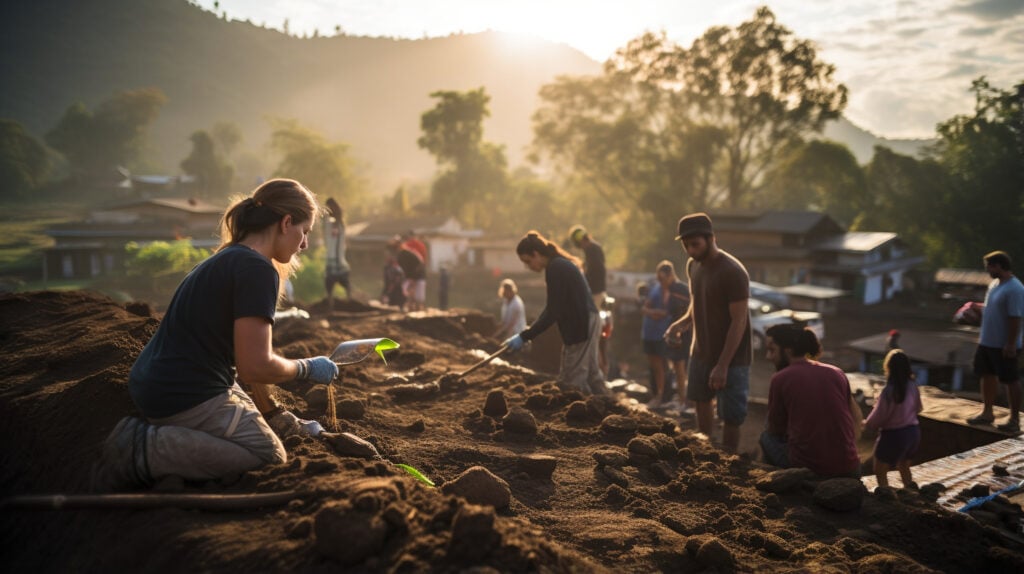Are you someone who loves to explore new destinations, seek thrilling experiences, and make a positive impact on the world? If so, you’re in the right place! In this article, we will dive into the exciting world of adventure and philanthropy, where meaningful travel experiences combine the thrill of adventure with the fulfillment of giving back.
Traveling is not just about visiting popular tourist spots and taking beautiful photos. It’s about immersing yourself in different cultures, learning from diverse perspectives, and making a difference in the lives of others. Adventure tourism and volunteer travel offer unique opportunities to do just that.
Whether you’re seeking adrenaline-pumping activities, such as trekking through remote landscapes or bungee jumping off breathtaking cliffs, or if you’re more inclined towards volunteering your time and skills to support local communities, there is a wide range of options for you to choose from. So let’s embark on this exciting journey of exploring adventure and philanthropy together!
The Global Adventure Tourism Market
Overview and Predictions
Adventure tourism has gained immense popularity in recent years, with more and more people seeking meaningful travel experiences that go beyond typical tourist activities. According to research, the global adventure tourism market was valued at $288 billion in 2021 and is projected to reach a staggering $4.6 trillion by 2032. This significant growth indicates the increasing demand for adventure-based activities and the willingness of travelers to explore new territories.
Impact of Adventure Tourism on Economy and Community
Adventure tourism plays a vital role in boosting local economies and supporting communities. When travelers engage in adventure-based activities, they often spend money on accommodations, dining, transportation, and local services. This influx of tourism dollars helps create job opportunities and generates revenue for local businesses. Additionally, adventure tourism encourages the development of infrastructure and amenities in destinations, making them more accessible and attractive to visitors.
Adventure Tourism Growth and Popularity
The popularity of adventure tourism can be attributed to several factors. Firstly, modern travelers seek new and exciting experiences that allow them to step out of their comfort zones and create lifelong memories. Adventure activities such as hiking, rock climbing, and wildlife safaris provide a sense of thrill and fulfillment that traditional tourism may not offer. Secondly, the rise of social media has contributed to the growth of adventure tourism, as travelers share their remarkable experiences, inspiring others to embark on similar journeys.
Risk Factors and Impacts on Health
While adventure tourism can be exhilarating, it is not without risks. Engaging in physically demanding activities and venturing into unfamiliar environments can pose potential hazards. It is important for travelers to be aware of the risks associated with their chosen activities and take appropriate safety precautions. Additionally, adventure travel may also have an impact on one’s health, as activities can be physically demanding and mentally challenging. However, with proper planning, preparation, and adherence to safety guidelines, the benefits of adventure tourism can far outweigh the risks.
Adventure Tourism Classification: Soft Vs. Hard
Adventure tourism activities can be classified into two categories: ‘soft adventure’ and ‘hard adventure’.
Soft adventure encompasses activities that are relatively low-risk and suitable for individuals with varying fitness levels. Examples may include guided hikes, biking tours, cultural immersion experiences, and wildlife spotting. Soft adventures are accessible to a wider range of travelers, including families and individuals who may not have extensive outdoor experience.
Hard adventure activities, on the other hand, involve higher levels of physical exertion, technical skills, and potential risks. These may include activities like mountaineering, white-water rafting, bungee jumping, and extreme sports. Hard adventures attract thrill-seekers who are looking for adrenaline-pumping experiences and are willing to face greater challenges.
Remember, adventure tourism is not limited to a specific age group. While it is often associated with young and adventurous individuals, the average age of adventure travelers falls between 29 and 40 years old. People of all ages can enjoy the excitement and rewards of adventure-based travel.
Adventure tourism offers an array of thrilling activities, provides economic benefits to local communities, and contributes to personal growth and self-discovery. As this industry continues to expand, it is essential for travelers to be mindful of the potential risks and take necessary precautions to ensure a safe and memorable adventure.
Volunteer Travel: An Emerging Trend in Adventure Tourism
In recent years, there has been a growing trend in adventure tourism towards meaningful travel experiences that combine exploration with philanthropy. Volunteer travel, also known as voluntourism, offers individuals the opportunity to immerse themselves in local communities and make a positive impact while enjoying thrilling adventures. This section will explore the rise of volunteer travel and highlight the range of experiences available to adventurous travelers.
Life-Changing Experiences through Volunteerism
Volunteer travel is more than just a vacation – it is an opportunity to engage with local communities, contribute to meaningful projects, and gain a deeper understanding of different cultures. By volunteering abroad, travelers can make a tangible difference in the lives of others and create lasting memories for themselves. Some of the life-changing experiences that volunteer travel offers include:
- Making a Difference: Whether it’s teaching English to children, building homes for the underprivileged, or participating in wildlife conservation efforts, volunteer travelers have the chance to positively impact the lives of others and contribute to sustainable development.
- Cultural Exchange: Volunteer travel provides a unique opportunity to learn from and connect with people from different backgrounds. It allows travelers to immerse themselves in local customs, traditions, and lifestyles, fostering understanding and appreciation for diverse cultures.
- Personal Growth: Engaging in volunteer work can be a transformative experience. It challenges travelers to step outside their comfort zones, develop new skills, and gain a greater sense of empathy and perspective. It can also enhance their resume and professional development.
- Building Connections: Volunteering abroad often involves collaborating with like-minded individuals from around the world. This creates a sense of camaraderie and offers the chance to form lasting friendships with people who share a passion for adventure and making a difference.
Growth Trends in Volunteer Travel
Volunteer travel has gained considerable popularity in recent years, as people seek more meaningful and socially responsible travel experiences. The growth trends in this sector are driven by several factors:
- Increased Awareness: With advancements in technology and the rise of social media, travelers are more connected and informed than ever before. They are increasingly aware of global issues and the impact they can have through volunteer work.
- Desire for Authentic Experiences: Today’s travelers seek experiences that go beyond traditional sightseeing. They want to engage with local communities, learn their stories, and contribute to positive change. Volunteer travel fulfills this desire for authentic and immersive experiences.
- Emphasis on Sustainability: Sustainable tourism is a key concern for the industry and travelers alike. Volunteer travel offers a way for individuals to support environmental conservation efforts, promote social inclusion, and contribute to the local economy in a responsible manner.
- Focus on Personal Fulfillment: Many individuals are seeking fulfillment and purpose in their travels. Volunteer opportunities provide a sense of purpose and fulfillment by allowing travelers to make a meaningful impact on the lives of others.
Range of Volunteer Travel Experiences
Volunteer travel encompasses a wide range of experiences, catering to different interests and skill sets. Some popular types of volunteer programs include:
- Teaching and Education: This involves teaching English, assisting with educational programs, and promoting literacy in underserved communities.
- Environmental Conservation: Participants work on conservation projects such as wildlife conservation, reforestation, and marine conservation efforts.
- Community Development: Volunteers contribute to infrastructure development, housing construction, and community empowerment initiatives.
- Healthcare and Medical Programs: These programs involve working alongside healthcare professionals to provide medical assistance and support in underprivileged areas.
- Animal Welfare: Volunteers assist in animal rescue centers, wildlife sanctuaries, and rehabilitation programs.
In conclusion, volunteer travel is an emerging trend in adventure tourism that offers individuals the opportunity to combine exploration with philanthropy. Through volunteer work abroad, travelers can have life-changing experiences, contribute to sustainable development, and form connections with people from different cultures. The growth trends in this sector highlight the increasing desire for meaningful travel experiences and the importance of socially responsible tourism. Whether it’s teaching, environmental conservation, community development, healthcare, or animal welfare, there is a volunteer travel program available to suit every adventurous traveler’s interests and passions. So why not embark on an adventure that not only satisfies your wanderlust but also makes a positive difference in the world?
Potential Challenges of Adventure and Volunteer Travel
While adventure and volunteer travel offer incredible opportunities for personal growth and making a positive impact, it’s important to be aware of the potential challenges that may arise. Here are some key challenges to consider:
Impact on Local Community
- Dependency: In some cases, communities may become reliant on tourism and volunteer projects for their economy, leading to a dependency that can be unsustainable in the long term.
- Cultural Dilution: The influx of tourists and volunteers can impact the local culture and traditional way of life. It is important to respect and preserve the local customs and traditions.
- Resource Allocation: Tourism and volunteer projects can put a strain on local resources, such as water, energy, and infrastructure. It is crucial to ensure responsible resource management.
Environmental Concerns
- Ecological Footprint: Adventure and volunteer travel activities can have an ecological footprint, impacting delicate ecosystems and biodiversity. It is vital to engage in practices that prioritize environmental conservation and sustainability.
- Carbon Footprint: Travel emissions contribute to climate change. It is important to consider ways to minimize carbon footprint, such as choosing eco-friendly transportation options, offsetting carbon emissions, and supporting local initiatives for environmental preservation.
- Waste Management: It is essential to practice responsible waste management, including reducing, reusing, and recycling waste, and respecting local waste disposal systems.
Communication and Adaptation Challenges
- Language Barriers: Traveling to a foreign country often involves overcoming language barriers. It is helpful to learn basic phrases and use translation tools to facilitate communication.
- Cultural Sensitivity: Different cultures have unique norms, customs, and behaviors. Being aware and respectful of cultural differences will help foster positive interactions and avoid unintentional misunderstandings.
- Adapting to Local Conditions: Adventure and volunteer travel may take you to remote or challenging locations where you’ll need to adapt to different climates, living conditions, and limited resources. Flexibility and adaptability are key.
It’s important to address these challenges proactively and responsibly, not only to ensure a positive experience for yourself but also to prioritize the well-being of the local community and the environment. By being conscious of these challenges, you can take steps to mitigate their negative impacts and maximize the positive outcomes of your adventure and volunteer travel experiences.
Remember, sustainable and responsible travel is the key to creating meaningful and lasting change in the world. Happy travels and volunteering!
Conclusion
In conclusion, adventure and volunteer travel offer the perfect blend of excitement, personal growth, and positive impact on communities and the environment. These meaningful travel experiences allow individuals to explore the world, connect with different cultures, and make a difference in the lives of others. Here are a few key takeaways:
- Adventure tourism is a rapidly growing industry, with the market size projected to reach $4.6 trillion by 2032. This growth highlights the increasing demand for unique and thrilling travel experiences. Adventure activities are classified into “soft adventure” and “hard adventure,” catering to a wide range of interests and preferences.
- Volunteer travel is an emerging trend within the adventure tourism sector. It offers individuals the opportunity to combine their passion for exploration with meaningful engagement through various volunteer projects. This form of travel allows volunteers to contribute to community development, conservation efforts, education, and healthcare, among other areas.
- Both adventure and volunteer travel come with their own set of challenges. It is crucial to be mindful of the potential impacts on local communities and the environment. Responsible and sustainable travel practices can help mitigate these challenges and ensure a positive and lasting impact.
At A Broader View Volunteers, we are committed to providing life-changing volunteer experiences that empower local communities and create positive change worldwide. With projects in over 32 countries across Africa, Asia, Central America, and South America, we offer a wide range of volunteer opportunities for individuals who want to make a difference while exploring the world.
Whether you’re passionate about wildlife conservation, education, or healthcare, our programs are designed to provide meaningful experiences that foster personal and professional growth. Join us for an adventure that leaves a lasting impact!
To learn more about A Broader View Volunteers and our programs, visit our website at www.abroaderview.org. Begin your journey towards meaningful travel and discover the transformative power of adventure and volunteerism.
Frequently Asked Questions
- What is meaningful travel?Meaningful travel refers to a type of travel that goes beyond typical tourist activities and focuses on immersing oneself in local culture, making a positive impact on communities, and engaging in activities that promote personal growth and understanding.
- How can I have a meaningful travel experience?To have a meaningful travel experience, consider volunteering or participating in community projects, engaging with locals, learning about the culture and traditions of the destination, and choosing activities that align with your personal values and interests.
- What is adventure philanthropy?Adventure philanthropy combines adventure travel with volunteer work and philanthropic efforts. It allows travelers to actively contribute to charitable causes while enjoying exciting and immersive travel experiences.
- How does adventure philanthropy benefit local communities?Adventure philanthropy benefits local communities by providing them with much-needed support and resources for essential projects, such as education, healthcare, infrastructure development, and conservation. It also fosters cultural exchange and mutual understanding between travelers and locals.
- How can I get involved in adventure philanthropy?To get involved in adventure philanthropy, you can research and join reputable organizations that offer adventure philanthropy programs. These programs often include volunteering opportunities, cultural immersion, and adventure activities that contribute to meaningful, sustainable development.



